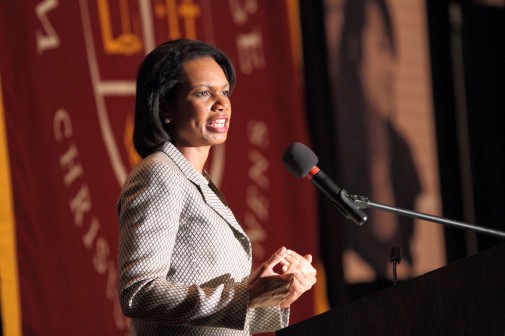Rice Touts Virtues of ‘Messy’ Democracy
By
Westmont

[View pictures from the breakfast and convocation]
Condoleezza Rice, who has served as both national security advisor and U.S. secretary of state, talked about freedom, democracy and education at the Westmont President’s Breakfast March 4. More than 860 people attended the breakfast in the main ballroom of Fess Parker’s Doubletree Resort and an adjoining room that featured a live simulcast.
“Westmont is a place that values the student experience,” Rice said, “not just the liberal arts experience, but one that teaches students that faith and reason are not enemies of one another but rather that they go hand in hand to make a complete and total human being.”
Rice also recalled several compelling personal stories that she detailed in her most recent book, “Extraordinary, Ordinary People: A Memoir of Family.”
“(A Westmont education) will teach them to be people who understand as my parents taught me that you might not always be able to control your circumstances, but you can control your response to your circumstances,” Rice said. “That helps you to recognize that you should never be aggrieved because there are always others who are struggling more than you are and that you should never feel entitled because there are always those who have less than you have.”
Rice discussed Sept. 11 and the painful days that followed, concluding that the U.S.’s biggest threat comes from failed states. “It’s been a long journey in Afghanistan, which is the fifth poorest country in the world,” she said.”We need to find a way to help the people secure themselves and find a good life.
“Northern Mexico is beginning to resemble a failed state, which is a state where government authority doesn’t hold. Drug cartels can outgun the Mexican army, and this is a security concern for the U.S.”
Rice said that everyone deserves to live in freedom—not an American value or a Western value, but a universal value.
“People have the right to choose who will govern them, to say what they think, to worship freely, to be free from police and from the oppression of the state,” she said. “No one deserves to live in tyranny—we recognize the worth of the individual and we can’t live in comfort in the U.S. and not care about those who risk their lives for the freedoms we enjoy.”
Political unrest spreading through the streets of Cairo, Tunis and Tripoli added weight to Rice’s comments about democracy.
“When I spoke at Cairo University in 2005, I urged the Egyptian government to be out on the forefront of change,” she said. “Democracy is inefficient and messy and disruptive and some of us may think it doesn’t work too well even in our country, but democracy has this going for it: If we get too fed up, we can throw the bums out.”
She said the U.S. has advocated for democracy, change and human rights everywhere but in the Middle East, where we have promoted stability to get peace and have gotten neither. “The U.S. can’t fear democratic change because countries might elect leaders we won’t like or we will hear voices we don’t like,” she said.
Rice, professor of political economy at Stanford Graduate School of Business, Thomas and Barbara Stephenson Senior Fellow on Public Policy at the Hoover Institution and professor of political science at Stanford University, also discussed the importance of education. She told a story about her grandfather earning a scholarship at Spellman College after agreeing to become a Presbyterian minister. “He recognized the value of education and the family has been college-educated and Presbyterian ever since,” she said. “Education is a powerful, transforming force. … We can’t lose a whole generation of children who can’t read, who will be unemployable and left out of the values and beliefs that sustain us. If that happens we have lost the core of who we are.”
After the breakfast, Rice answered questions from a student panel during convocation in Murchison Gym. There, she candidly answered a question about the decision for the U.S. to attack Iraq and overthrow its dictator. “In Iraq the intelligence was not correct about WMDs—Saddam Hussein had used them in the past and had been close to developing a nuclear weapon,” she said. “Intelligence is always uncertain and we could have done a better job of talking about the uncertainties in giving the rationale for attacking Iraq. We will always have to deal with the lives lost. Nothing of value is achieved without sacrifice.”
Filed under
Campus News, Press Releases